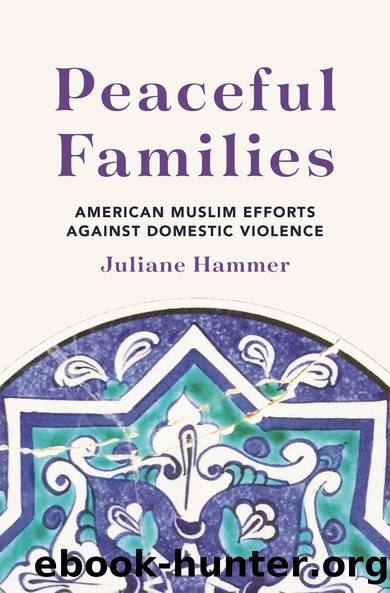Peaceful Families by Juliane Hammer

Author:Juliane Hammer [Hammer, Juliane]
Language: eng
Format: epub
Tags: Social Science, Sociology, Marriage & Family, Islamic Studies, Sociology of Religion, Violence in Society, Religion, Islam, General, Family & Relationships, Abuse, Domestic Partner Abuse
ISBN: 9780691194387
Google: frKMDwAAQBAJ
Publisher: Princeton University Press
Published: 2019-09-03T03:34:25+00:00
Reflecting on Authority and Authenticity
âAlhamdulillah, Allah has blessed me with knowledge, Allah has blessed me with the experience of knowledge. I have learned from my teachers, I have the honor to have learned from one of the greatest teachers of our time, X, and the mufti, Y, he is also my teacher. I also consult with them on many occasions.â This is how one of the imams introduced himself to the people gathered at the training. This set of claims to authority based on authoritative sources of knowledge, which form a chain of knowledge transmission central to Islamic knowledge production, is quite typical for the way in which religious leaders and scholars perform authority as well as religious authenticity.42
The imam trainings were gatherings of religious scholars and leaders who all, in complex and fascinating ways, tried to impress one another and jockeyed for positions in a hierarchical structure of authority to be established. Such hierarchy only partially exists in Sunni Islam (Shiâa Muslims have hierarchies of religious scholars), and recognition as a significant scholar or authoritative leader has to be granted by a following of lay Muslims and/or communities. In a gathering of imams, though, all the men in attendance had some authority, which they leveled at one another and performed in a variety of ways. The presence of women, including one woman with significant professional authority as a practitioner, was either tacitly ignored in their competition or perhaps fueled it to some degree because the women could be impressed by such performances.
One imam told the story of how his wife of now thirty-five years, in their first week of marriage, called him, punched him in the stomach so hard that he fell to his knees, coughing, and then proceeded to tell him that she could always defend herself. She had been a karate trainer for Muslim girls in the Nation of Islam. All the imams laughed together at the story and, repeatedly, throughout the day referred back to it by telling him that he should have been in the Garments video or that he was proof that men are abused as well. Arguably, the story itself does not show the man as authoritative or masculine, but the laughs about it as well as the continuous joking references to it marked the space of the training as male. They also asserted the masculinity of the other imams. I found nothing funny about any of the abuse stories, regardless of whether they involved women, children, or men as victims.
When Karima was presenting on forms of abuse, the imams frequently contributed to the conversation, often by interrupting her, thus both challenging her authority and asserting their own. They confirmed what she said as well, so authority was distributed in a complex way when she spoke. She was the professional expert in the room and the imams, albeit reluctantly at times, deferred to her authority and superior knowledge in some areas. Karima actively encouraged the imamsâ participation and repeated several times that they
Download
This site does not store any files on its server. We only index and link to content provided by other sites. Please contact the content providers to delete copyright contents if any and email us, we'll remove relevant links or contents immediately.
| Hadith | History |
| Law | Mecca |
| Muhammed | Quran |
| Rituals & Practice | Shi'ism |
| Sufism | Sunnism |
| Theology | Women in Islam |
The History of Jihad: From Muhammad to ISIS by Spencer Robert(2213)
Nine Parts of Desire by Geraldine Brooks(2011)
The Turkish Psychedelic Explosion by Daniel Spicer(1995)
The First Muslim The Story of Muhammad by Lesley Hazleton(1888)
The Essential Rumi by Coleman Barks(1636)
The Last Mughal by William Dalrymple(1574)
Trickster Travels: A Sixteenth-Century Muslim Between Worlds by Davis Natalie Zemon(1546)
1453 by Roger Crowley(1497)
by Christianity & Islam(1352)
God by Aslan Reza(1336)
Muhammad: His Life Based on the Earliest Sources by Martin Lings(1299)
A Concise History of Sunnis and Shi'is by John McHugo(1279)
Magic and Divination in Early Islam by Emilie Savage-Smith;(1203)
The Flight of the Intellectuals by Berman Paul(1185)
No God But God by Reza Aslan(1162)
Art of Betrayal by Gordon Corera(1136)
What the Qur'an Meant by Garry Wills(1122)
Getting Jesus Right: How Muslims Get Jesus and Islam Wrong by James A Beverley & Craig A Evans(1083)
The Third Choice: Islam, Dhimmitude and Freedom by Durie Mark & Ye'or Bat & Bat Ye'or(1070)
